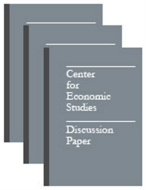The Cross-Section of Labor Leverage and Equity Returns
The Cross-Section of Labor Leverage and Equity Returns
Working Paper Number: CES-17-70
Abstract
We study labor-induced operating leverage. Theoretically, we show that if labor markets are frictionless, two sufficient conditions for the existence of labor leverage are (a) relatively smooth wages and (b) a capital-labor elasticity of substitution strictly less than one. Our model provides theoretical support for the use of labor share—the ratio of labor expenses to value added—as a measure of labor leverage. We provide evidence for conditions (a) and (b), and we demonstrate the economic significance of labor leverage: High labor-share firms have operating profits that are more sensitive to economic shocks and have higher expected returns.
Others in Series
Working Paper
The Parental Gender Earnings Gap in the United States
Working Paper
Just Passing Through: Characterizing U.S. Pass-Through Business Owners
Working Paper
Total Error and Variability Measures with Integrated Disclosure Limitation for Quarterly Workforce Indicators and LEHD Origin Destination Employment Statistics in OnTheMap
Page Last Revised - October 8, 2021




